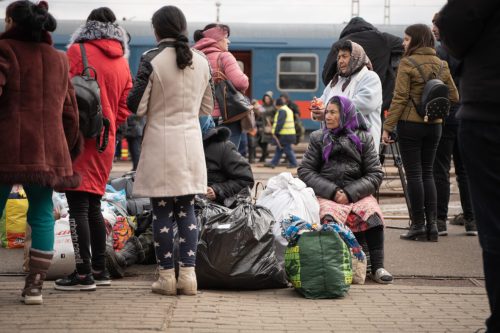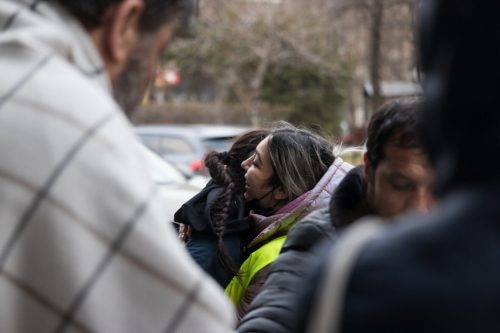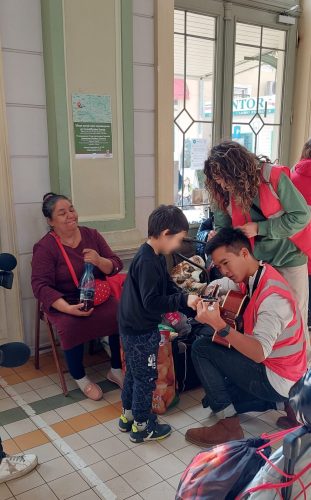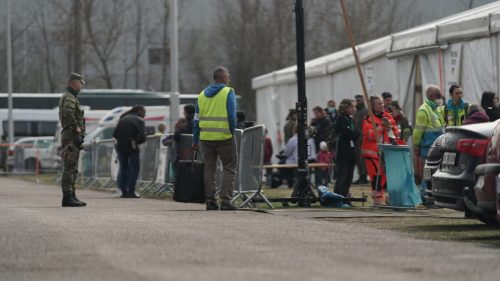Roma for Roma: Documenting the Oral History of Roma Refugees from Ukraine
Following the outbreak of the war in Ukraine and the mass exodus of refugees, the European Roma Institute for Arts and Culture – ERIAC has taken immediate action to document the experiences of Roma refugees from Ukraine and the work of Roma organizations and activists in response to the humanitarian crisis.
In order to record and document the situation of Roma fleeing Ukraine as well as Roma-led actions to help refugees on the borders of Ukraine, ERIAC has deployed documentation teams in Hungary, Poland, Romania, and Slovakia. The teams are building a digital archive to document the Roma historical memory of the war, focusing on stories of survival, resistance, solidarity, and humanity, as well as providing reliable evidence of cases of mistreatment and discrimination experienced by Roma refugees.

9 March 2022 – A family in Záhony waiting to return back to Ukraine despite not knowing what remains left of their home. Photographed by: Ede Judt / European Roma Institute for Arts and Culture
Noting the extreme vulnerability and plight of the Roma minority affected by the Russian invasion of Ukraine, the archive aims to achieve the following objectives:
- To display unfiltered, first-hand accounts from Ukrainian Roma refugees, and act as a referential source for reliable information regarding the experiences of Roma refugees;
- To report on cases of discrimination on borders, in access to humanitarian aid, and at shelters in refugee-hosting countries, also as an appeal to the international community to ensure that the human rights of Roma refugees are upheld;
- To display the civic engagement and mobilization of Roma NGOs and activists supporting fellow Roma in need
- To highlight the transnational cooperation between Roma, especially from within the Proud Roma, Free Europe network
- To highlight the importance of the Romani language, as a crucial instrument for facilitating communication between Ukrainian Roma refugees and Roma from neighboring countries
- To commemorate the strength, courage and resistance of Roma refugees and promote the language of unity

17 March 2022 – Benetrice, a Roma volunteer from Aresel, says goodbye to a Ukrainian Roma girl at the Bucharest North railway station in Romania, after helping her and her family find accommodation. They cried and exchanged phone numbers after a long hug. Photographed by: Gyulai Bertalan / European Roma Institute for Arts and Culture – ERIAC
“Our work was not only about making videos and interviews, it was also about responding to people’s immediate needs,” recollects Oliver Mako of the DocuTeam in Slovakia. “We were in contact with many groups and individuals who were helping daily on the borders, including from the Roma Education Fund and the Rómsky inštitút.”
“We heard testimonies about acts of prejudice, racism and antigypsyism both in Poland and in Ukraine. We met people who, after not finding satisfactory opportunities in Poland and Germany, decided to go back to Ukraine. But we also heard about acts of unconditional support, empathy and solidarity, some of which we also witnessed,” reports Elżbieta Mirga-Wójtowicz of the Polish DocuTeam.

26 March 2022 – Volunteers entertaining Roma children and families at the train station in Przemyśl, Southern Poland. Photographed by: Tomasz Kosiek / European Roma Institute for Arts and Culture – ERIAC
“In anticipation of our first two-week mission,” explains Sara Budrala of the Romanian DocuTeam, “the difficulties that flashed before our eyes were very different from the ones we had to face out in the field. Documenting the deeply moving stories of Roma refugees and navigating in a pool of constant uncertainty was very challenging.” “We saw both beautiful and horrible situations. We had a chance to witness a Roma man reuniting with his family and meeting his great-granddaughter for the first time, who is thought to be the first Roma refugee baby born in Hungary. But we also witnessed the poverty and inequality that Roma people face,” says Erdély Jakab of the DocuTeam in Hungary.

30 March 2022 – Roma volunteer patiently waits outside a Refugee Center in Michalovce, Eastern Slovakia. Photographed by: Martin Daško / European Roma Institute for Arts and Culture – ERIAC
Materials from the digital archive will be published regularly on the Proud Roma, Free Europe and ERIAC platforms.
![]() Together with the transnational Roma movement, ERIAC stands in solidarity with Roma in Ukraine and Ukrainian Roma refugees. Join our campaign to support our sisters and brothers: https://www.gofundme.com/f/support-for-the-brave-people-of-ukraine
Together with the transnational Roma movement, ERIAC stands in solidarity with Roma in Ukraine and Ukrainian Roma refugees. Join our campaign to support our sisters and brothers: https://www.gofundme.com/f/support-for-the-brave-people-of-ukraine